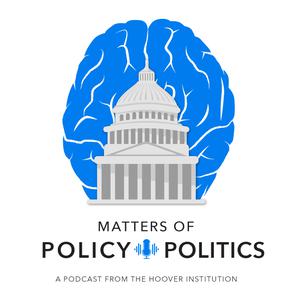
Matters of Policy & Politics
Hoover Institution
Matters of Policy & Politics is a Hoover Institution podcast devoted to matters of governance and balance of power at home and abroad. It is hosted by Hoover fellow Bill Whalen.
- 47 minutes 25 secondsNow What Do We Do?
And so the great American election crisis that was destined to be, didn’t happen – the end-result stirring relatively little in the way of legal challenges or disruption of the constitutional process, with the public feeling better about the democratic process (or so the post-election polls suggest).
In this, the last of four installments on election integrity in the 2024 campaign cycle, Ben Ginsberg, the Hoover Institution’s Volker Distinguished Visiting Fellow and a preeminent authority on election law, joins Hoover distinguished policy fellow Bill Whalen to discuss whether America’s crazy quilt of election systems and safeguards was formidable or merely fortunate in 2024, what laws a Republican Congress might pursue (voter ID?), plus future Hoover endeavors to help craft better ways of holding elections in America.
Recorded on December 11th, 2024.
13 December 2024, 4:55 pm - 51 minutes 46 secondsAmerica’s Shifting Latino Vote: Tectonics Trumps All?
Among the surprise results in this year’s American election: a victorious Donald Trump improving his numbers among Latino voters to a level not seen in 20 years and George W. Bush’s re-election (the only other time this century that the Republican choice won the popular vote).
David Leal, a Hoover Institution adjunct senior fellow and University of Texas-Austin professor of government specializing in American demographic changes, discusses why Latino voters turned Trump’s way, how 2024’s inroad impacts the idea of demography as destiny ( i.e., a growing minority population working to the Democrats’ advantage), plus Texas returning to its redder self despite talk of newcomers from other states making the Lone Star State more competitive.Recorded on November 20, 2024.
25 November 2024, 4:00 pm - 50 minutes 42 secondsCalifornia Update: The Golden State’s Black-and-Blue Election
The verdict on California’s November election? America’s largest “blue” state emerged black-and-blue as voters sent bruising, non-progressive messages regarding public safety, wage increases, and future approval of local bonds. Hoover senior fellow Lee Ohanian and distinguished policy fellow Bill Whalen, both contributors to Hoover’s California on Your Mind web channel, join Hoover senior product manager Jonathan Movroydis to discuss the latest in the Golden State, including the political futures of vice president Kamala Harris and governor Gavin Newson (does she want his job?). They also discuss a special legislative session to “Trump-proof” the Golden State, plus the remote likelihood of Sacramento and Washington cooperating on changes to federal immigration policy.
Recorded on November 20, 2024.
21 November 2024, 5:30 pm - 55 minutes 5 secondsRestoring Confidence in Congress: Will the House Come to Order?
By most metrics – a 16% job-approval rating, failing to deliver budgets much less conducting itself in a stately manner – the U.S. House of Representatives isn’t living up to the Founding Fathers’ ideals. How to restore the public’s confidence in the ways of Capitol Hill? Brandice Canes-Wrone, the Hoover Institution’s Maurice R. Greenberg senior fellow and the founding director of Hoover’s Center for Revitalizing American Institutions, joins former Illinois congressman and Hoover distinguished fellow Daniel Lipinski to discuss Revitalizing the House: Bipartisan Recommendations on Rules and Process – suggested ways to re-empower House members and committees and restore some semblance of the democratic process.
Recorded on November 12, 2024.
14 November 2024, 7:34 pm - 48 minutes 56 secondsAmerica Votes – The System Holds
And so the great election meltdown that was supposed to happen didn’t – across America this week, tens of millions of voters going about their business in a seemingly orderly fashion, with a decisive outcome favoring one presidential candidate and his party.
In this, the third of a four-part series on election integrity, Ben Ginsberg, the Hoover Institution’s Volker Distinguished Visiting Fellow and a preeminent authority on election law, joins Hoover distinguished policy fellow Bill Whalen to discuss how voting played out on Election Day in America – results that surprised Ben, how different systems and vote-counting processes held up in battleground states, plus what election reforms a new Congress might want to pursue in 2025 (translation: requiring identification, greater uniformity and addressing non-citizen voting).
Recorded on November 7, 2024
8 November 2024, 4:55 pm - 54 minutes 33 secondsCalifornia Update: Election Eve In The Golden State – The Times (And The L.A. Times) They Are A-Changin’
What to expect in a California election that shows some prominent big-city incumbents in trouble and an anti-crime ballot measure steamrolling to victory?
As Election Day approaches, Hoover senior fellow Lee Ohanian and distinguished policy fellow Bill Whalen, both contributors to Hoover’s California on Your Mind web channel, join Hoover senior product manager Jonathan Movroydis to discuss the latest in the Golden State including the spectacle of government-envisioned “tiny houses” with not-so-tiny costs. They also discuss what a non-endorsement in the presidential race says about the troubled state of the state’s once-mightiest newspaper, and how Governor Gavin Newsom can move forward in 2025, depending on who becomes America’s 47th president.
Recorded on October 31, 2024.
1 November 2024, 4:00 pm - 46 minutes 13 secondsClose Encounters Of The Coos County Kind
Justin Grimmer, a Hoover Institution senior fellow and Stanford University political scientist, joins Ben Ginsberg, the Hoover Institution’s Volker Distinguished Visiting Fellow and a preeminent authority on election law, to discuss what the former’s visit to Coos County, Oregon, revealed about trust in the election process and the challenges involved in debunking election-integrity myths. Their suggestions for curbing skepticism: losing candidates admitting defeat, encouraging the public to look “under the hood” at how elections are administered, and encouraging early voting to minimize dramatic vote swings after Election Day. Also discussed: the impact (or lack thereof) of voter-identification laws and reduced early-voting windows on turnout this fall.
Recorded on October 28, 2024
29 October 2024, 3:00 pm - 56 minutes 51 seconds“The Good, the Bad and the Ugly” of Election Integrity
Wednesday, October 16, 2024 - 56 min listen
Hoover Institution | Stanford UniversityLike a storm headed to America’s shores, the November forecast calls for the sound and fury of a contentious election that challenges the public’s trust in democracy. Ben Ginsberg, the Hoover Institution’s Volker Distinguished Visiting Fellow is a preeminent authority on election law. Ginsberg revives his Saints, Sinners And Salvageables podcast series from two years ago with this kickoff installment examining whether battleground states are better prepared this election cycle than in recent election cycles, plus Ginsberg explores possible legal challenges that might happen before, during, and after the vote-count.
Recorded on October 14, 2024.
15 October 2024, 8:36 pm - 42 minutes 40 secondsGames People Play
Why did the “best and brightest” of the Kennedy and Johnson administrations continue with a flawed Vietnam strategy despite years of wargaming simulations warning that there were no good outcomes for American involvement? Jacquelyn Schneider, the Hoover Institution’s Hargrove Hoover Fellow and director of Hoover’s Wargaming and Crisis Simulation Initiative, discusses the role of the 1960’s “SIGMA Games” in deciding Southeast Asia options, how wargaming influenced America Cold War strategy, its use in making sense of present-day enigmas (China, Russia), plus the challenges in playing out scenarios in the “final frontier” that is outer space.
9 October 2024, 4:00 pm - 53 minutesBill-Signing Recap – Deep Fakes, Deep Dodges...and Deeply Indebted to an NBA Owner
Who are the winners and losers now that California Governor Gavin Newsom has signed off on hundreds of legislative bills? Hoover senior fellow Lee Ohanian and distinguished policy fellow Bill Whalen, both contributors to Hoover’s California on Your Mind web channel, join Hoover senior product manager Jonathan Movroydis to discuss why the past month in Sacramento was good news for teen-abuse victim Paris Hilton (Newsom signed a bill she championed) and Los Angeles Clipper’s owner Steve Ballmer (his new arena received a late-night alcohol exception); and bad news for Elon Musk (he didn’t get his way on a controversial AI measure as his social-media feud with the governor continues). Possibly the worst news is for Californians fond of direct democracy and election integrity (Newsom vetoed a voter ID requirement). Then, the legislature approved a constitutional amendment altering California’s recall process which voters will decide on in 2026.
2 October 2024, 5:00 pm - 1 hour 3 minutesWhat Polling Says About Trump, Harris And An Election “Doom Loop”
Is the current presidential election lining up along the same lines as the past two Trump referenda with a small number of swing states and an even smaller subset of issues (in 2024: jobs, inflation, immigration, and wars) deciding who will become America’s 47th president?
David Brady and Douglas Rivers, Hoover Institution senior fellows and managers of a tracking poll on the US electorate, discuss what’s different in a contest featuring known (Donald Trump) and lesser known (Kamala Harris) entities, what matters most to independent voters, the odds of one or both chambers of Congress flipping, plus whether Pennsylvania is the “new Florida” as ground zero for deciding presidential outcomes.
27 September 2024, 3:55 pm - More Episodes? Get the App
Your feedback is valuable to us. Should you encounter any bugs, glitches, lack of functionality or other problems, please email us on [email protected] or join Moon.FM Telegram Group where you can talk directly to the dev team who are happy to answer any queries.
 Victor Davis Hanson's The Classicist
Victor Davis Hanson's The Classicist
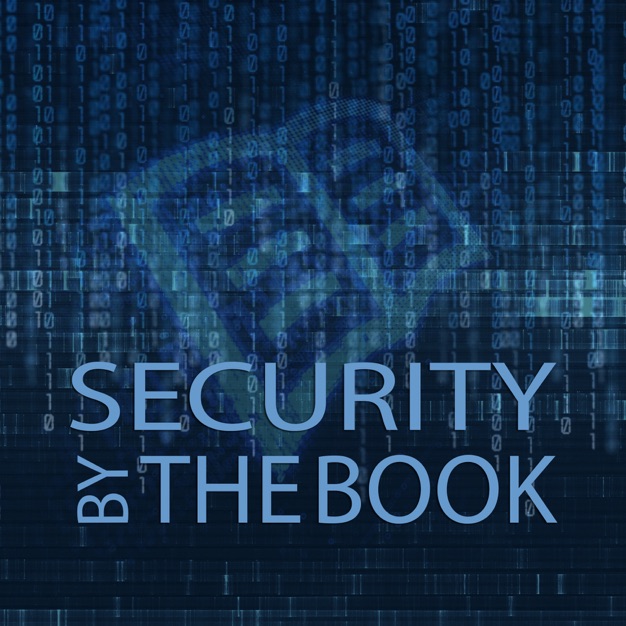 Hoover Institution: Security by the Book
Hoover Institution: Security by the Book
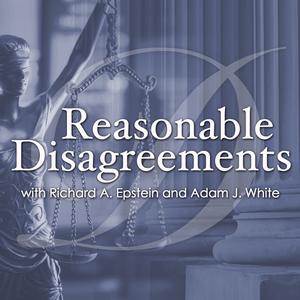 Reasonable Disagreements
Reasonable Disagreements
 Uncommon Knowledge
Uncommon Knowledge
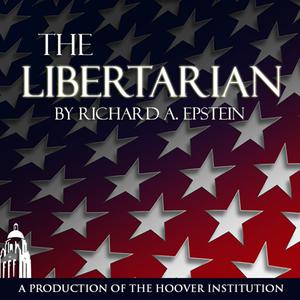 Libertarian
Libertarian
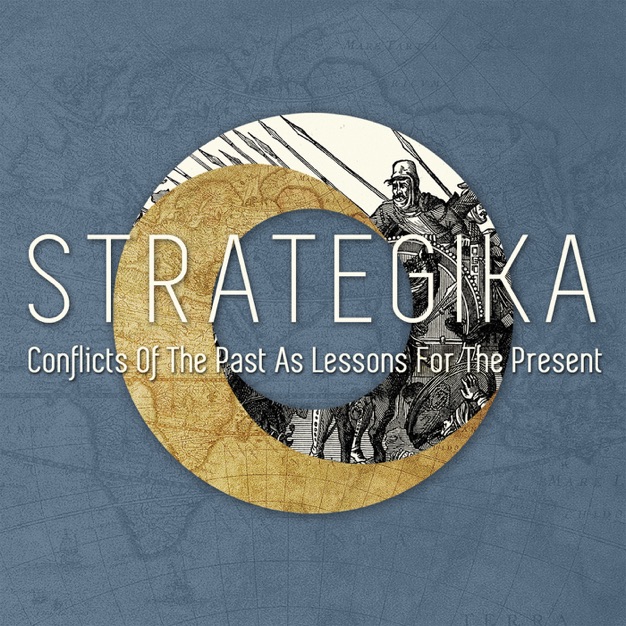 Hoover Institution: Strategika
Hoover Institution: Strategika